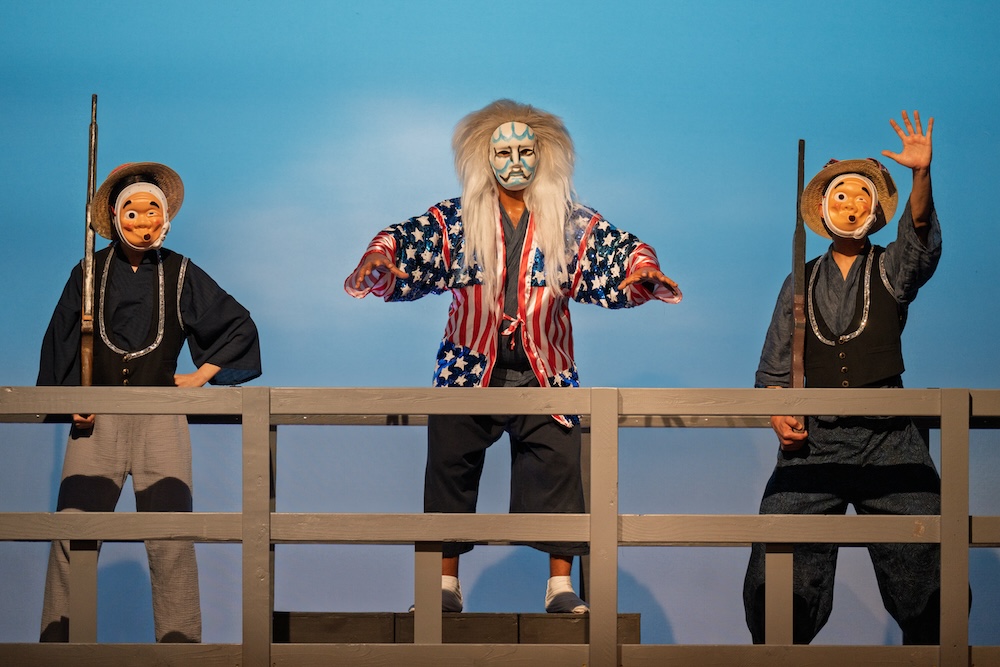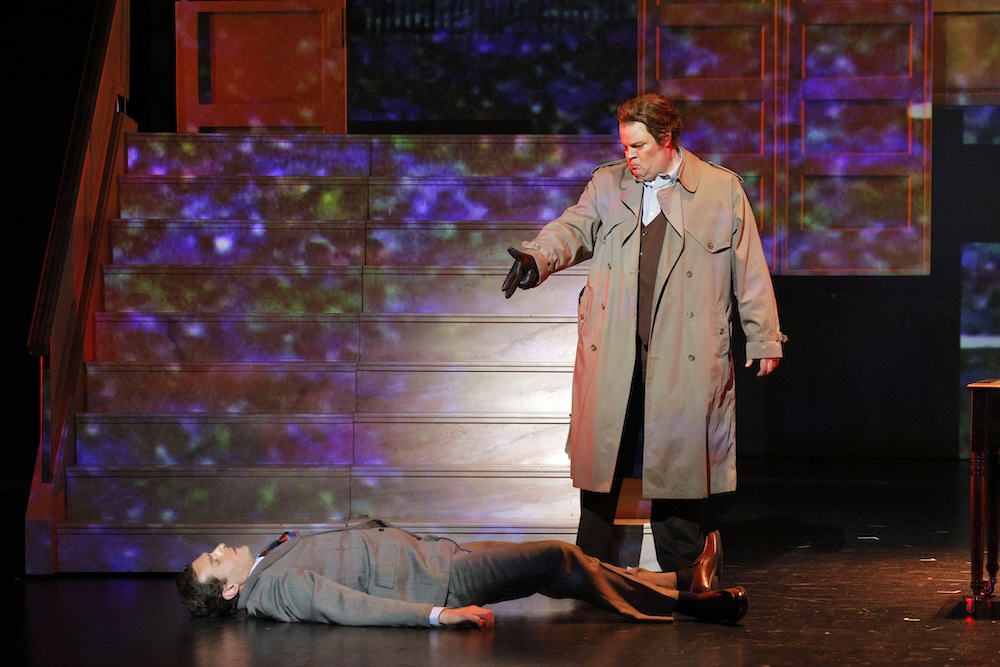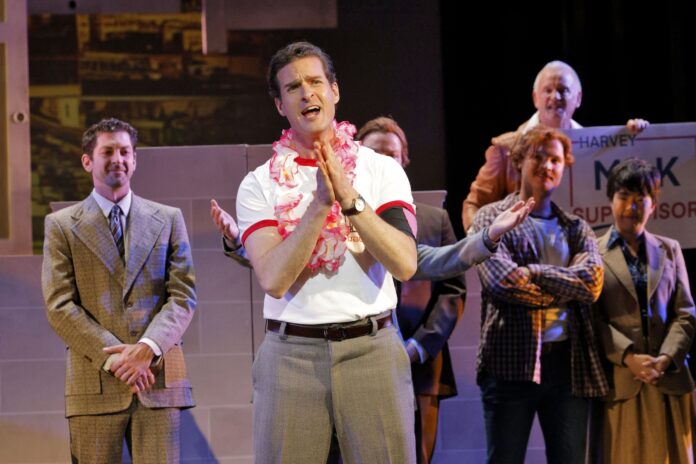I haven’t been to EXIT Theatre since 2020. I forget what I saw, but if I’d known that it would be my last trip to the unofficial heart of SF indie theatre, I would’ve made that memory last. EXIT’s 2022 closure further illustrated SF’s (and the country’s) indifference towards the arts, particularly independent organizations. I highly recommend Nicole Gluckstern’s fantastic EXIT post-mortem to understand how this Tenderloin storefront became the center of our universe.
I did help announce EXIT’s (semi-)return as Taylor Street Theatre in the namesake former home of the late Cutting Ball Theatre. Last year, I spoke with co-founder Richard Livingston, who has dealt with artistic red tape since the pre-Reagan era. He had a sobering description of the endless evolution of the indie arts scene. Yes, he was disappointed about dried-up funding and bureaucracy, but he found assurance in the drive of unstoppable artists who will always find a place to show their work, even if they have to build it themselves.
As Guv-Gav tries to hacks away at arts funding and win Republicans’ favor, it’s more important to not only support local indie arts, not only expose them to friends, loved ones, and strangers, but also embrace the idea that our art scene isn’t dying—that instead, it’s evolving. Successful fundraisers like those of SF Mime Troupe show how to adapt, whilst the transformations of EXIT on Taylor and Stage Werx into Taylor Street and Eclectic Box, respectively, remind us that there are still spaces available. An uphill battle isn’t a battle lost.
Perhaps that’s foolish hope, but as I continue to push ahead in my erratic personal life, so too do I take inspiration from the artists and collectives who are rolling with the punches and continuing to fight rather than rolling over and dying. One of the shows I talk about below is about a famous San Franciscan who famously said “Ya gotta give ‘em hope.” You have to give ‘em more than that—but hope is necessary, too.

PACIFIC OVERTURES AT BRAVA! FOR WOMEN IN ARTS
Whenever I hear “Stephen Sondheim”, I think of a certain Bay Area theatre artist who most assuredly does not revere his work. It’s not that this person hates him, just that they don’t subscribe to the idea that Sondheim was The Great American Composer and Librettist. Even in the Bay Area, Sondheim commands such reverence amongst theatre nerds that describing him as “just another composer” gets the same reaction as whenever I say “Christopher Nolan is an overrated misogynist hack”. (The director reduces women to Madonna or whore, he can’t stage a fight scene to save his life, and all his scripts are plot-hole-ridden messes with tin-ear dialogue.) In other words, it’s an opinion.
Now, if Sondheim were ever to merit comparisons to Shakespeare, then Pacific Overtures (through June 15 at Brava! for Women in the Arts) is Sondheim’s equivalent to a “problem play”. Watching it, one can clearly see what he and his collaborators (book-writers John Weldman and Hugh Wheeler) were trying to do with the 1976 musical. That doesn’t mean they succeeded. Much like Webber and Rice with Evita (released two years later), Sondheim and company wanted to put music to a piece of history often overlooked by Western eyes. Both musicals have created timeless compositions; both musicals reek of the Western appropriation and misunderstanding.
Mimicking the style of Japanese theatre, Pacific Overtures means to tell the story of how the multi-island nation moved out of its feudal era into the industrial age. That meant transitioning from the age of samurai and kimonos to tailored suits and European delicacies. To the creators’ credit, they at least make an attempt at progressiveness by giving depth to the Japanese characters and portraying Europeans as invasion-happy buffoons (the opposite of the WWII propaganda the creators and their parents would have known from memory). Yet, despite all the catchy songs, the musical refuses to let you forget that it was written by a bunch of white guys with U.S. and European sensibilities. It’s less “let us reveal history to you” and more whitesplaining through broad caricature.
The folks at Kunoichi Productions, in collaboration with Brava! and the SF’s Japanese-themed Theatre of Yugen (whose Nick Ishimaru directs) know all this, and the production is clearly an attempt to inject some genuine Nippon perspective into this rarely produced anomaly. Yusuke Soi’s sets evoke woodcarvings and Yugen knowledge of classic Japanese theatre is clearly on display. Yet, there’s only so much they can do with a flawed text. Try as they might, there’s only so much blood they can pull from this stone.
As usual, there were very few masks on opening night. In fact, during intermission, I had to listen to the couple behind me kvetch about a friend of theirs who still masks: “I think he walks around in hazmat suit!” (Given the new strain of COVID wreaking havoc on our non-vaxxed nation, I don’t blame him.) Still, Brava!’s HVAC impressed me, not having been in the main theatre since performing there in 2021. CO² levels on my Aranet4 never got any higher than 940ppm during the two-act show. Not bad for century-old theatre.
Kunoichi Productions have found an adequate (mixed-race) cast to try and add genuine perspective to an infamous speculative piece. It’s an honorable attempt, but it doesn’t take much to see why this isn’t a Sondheim favorite.
PACIFIC OVERTURES runs through June 15. Brava! for Women in the Arts, SF. Tickets and more info here.

HARVEY MILK REIMAGINED BY PARALLÈLE
There’s such a tonal back-and-forth with Harvey Milk Reimagined (through June 7 at YBCA) that one wonders if composer Stewart Wallace and librettist Michael Korie felt overly obligated to make it fit within their chosen genre. No one would argue that the real Milk (played here by baritone Michael Kelly) was larger-than-life, making him just as worthy of operatic biography as Steve Jobs (though with a much better legacy).
Yet, the choice to use doom as the overarching motif of the opera seems counterintuitive. Sure, to know Milk’s story is to know that it ends at the violent hands of former colleague Dan White (tenor Christopher Ogelsby), but Wallace and Korie seem so captivated by that fact that they forget to celebrate the life of a man who literally brought his outlandish parties to SF City Hall.
The opera shares quite a few similarities to SF Opera’s The (R)evolution of Steve Jobs, though this one fares better. Both operas seem to have all the time in the world to explore their subjects, yet both choose to speed-run through their lives, denying many crucial moments room to breathe. Most of Milk’s colleagues and loved ones aren’t shown here, and the ones that are often don’t even get named: Scott Smith (tenor Henry Benson) goes through half of Act 1 before he’s ever called by name, and I don’t think Anne Kronenberg (mezzo Gabriela Stoloff-Báez) is named once? Equally baffling is the choice by the creators to lend credence to White’s infamous “Twinkie defense,” rather than showing the conservative former supe as having acted on long-growing hostility and bigotry.
Yet, the performances of all above reach the appropriate heights the story demands. Director Brian Staufenbiel uses the right amount of care in guiding his cast across Jacquelyn Scott’s magical set of floating SF Victorian doors and transparent screens. It’s what makes a West Side Story-esque balcony scene between Harvey and Scott not seem as ridiculous as it could have been. Instead, the scene and the entire opera truly work when dramatizing Milk as the wandering figure who truly found his place in the magical wonderland of San Francisco. It’s the celebrations of life that make the show work, not the obsession with his death.
Given that Harvey Milk’s colleagues (some of whom were present opening night) later went on to fight one infamous public health crisis, it was disappointing to see almost no masks in the crowd. Fortunately, YBCA’s HVAC kept CO² levels no higher than 829ppm during the two-act opera.
There’s no debating that Harvey Milk’s life ended in tragedy, but clinging too tightly to that tragedy prevents Harvey Milk Reimagined from achieving the greatness that one can see trying to burst from the seams. The man himself is no longer around to lend inspiration for scared queer kids, so it’s up to those of us who are here to remember that his life proved joy is an act of rebellion. This opera is a beautiful production featuring talented local artists, but it seems to have forgotten the final words of Milk’s self-recorded obituary: “Ya gotta give ‘em hope.”
HARVEY MILK REIMAGINED runs through June 7. Yerba Buena Center for the Arts, SF. Tickets and more info here.






